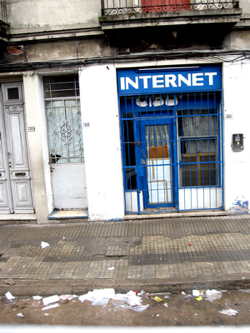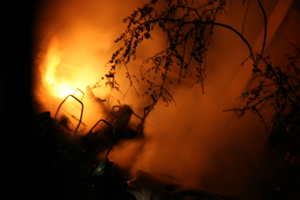 In this age and time we have a new God named Google and cyberspace is the sharia of all religions if we can explore its depths and disseminate its boundless treasures of knowledge.
In this age and time we have a new God named Google and cyberspace is the sharia of all religions if we can explore its depths and disseminate its boundless treasures of knowledge.
Seeking the gift of Reason from God’s glorious guidance.
G Gracious
O Omnipresent
O Omniscient
G God
L Living
E Eternally
The title of this article is deceptive since it is written for young students of great intellect and inspiration who could master these few precepts of Islam on their fingertips to educate the would-be-suicide-bombers the true meaning of Islam which is peace and reconciliation. These children of tragic times, either orphaned at early age or born into poor families are being recruited since decades by bigots and zealots as murderers, cutthroats and terrorists.
Once time-bombs are strapped to their bodies, they are left with no choice to save their lives, for if they tried to take it off they would be blown to pieces, so they in utter desperation of bravado, confusion or exultation hurl themselves into crowds for the satisfaction of countless others joining them in their sinful journey to death.
 As for the pious ignoramuses who have nothing left in their hearts but the fire of hatred continue to burn with the need to pour hatred into the hearts of the young and innocent Muslims so they too could be consumed by this fire for the sheer ecstasy of witnessing and gloating over their masterpieces of cruelty, violence and bloodshed.
As for the pious ignoramuses who have nothing left in their hearts but the fire of hatred continue to burn with the need to pour hatred into the hearts of the young and innocent Muslims so they too could be consumed by this fire for the sheer ecstasy of witnessing and gloating over their masterpieces of cruelty, violence and bloodshed.
Such fanatics wielding the weapon of hatred know how to feed their fledgling prey with the pseudo-reward of paradise, while creating hell on earth, and watching their young wards bribing God for the gift of houris in heaven. These nascent Violators of sanctity of life are the same puppets of demonic fanaticism who hijacked the Grand Mosque in Mecca in Year 1979 where thousands of worshippers were killed in the name of Islam.
Nothing is sacred to these bearded hatemongers. They are the same camel-riding, hate intoxicated zealots who had laid siege on the The House of God in Mecca, denouncing electronics, radio, television and forbidding such tools of progress, and labelling them unIslamic. Now these camel-riding demons, turned fanatic robots are making full use of the evil devices such as cell phone, and electronically timed bombs to let the evil flow in rivulets of blood without any feeling of shame, remorse or even a thought of doing penance.
For the sake of countering their streaks of evil, here are a few morsels of love, peace and harmony for the young generation of Muslims to offer to their less fortunate brethren whose pure minds are corrupted by the hatred of the few fanatics who fear neither God, nor care for the sanctity of any place or religion under the shadow of God’s Creation.
Announce O Muhammad, unto My slaves that verily I am Forgiving, the Merciful. (15:49 Quran)
And lo, there is a party of them who distort the Scripture with their tongues, that ye may think that what they say is from the Scripture, when it is not from the Scripture. And they say: it is from Allah, when it is not from Allah, and they speak a lie concerning Allah knowingly. ( 3:78 Quran)
Confound not truth with falsehood, nor knowingly conceal the truth. ( 2:42 Quran)
Beautified for mankind is love of the joys that come from women and offspring, and stored-up heaps of gold and silver, and horses and cattle and land. That is comfort of the life of the world. Allah, with Him is a more excellent abode. ( 3:14 Quran)
It is not for believer to kill a believer unless it be by mistake. ( 4:92 Quran)
Whoso slayeth a believer of set purpose, his reward is hell forever. Allah is wrath against him and He hath cursed him and prepared for him an awful doom. (4:93 Quran)
O ye who believe, squander not your wealth among yourselves in vanity, except it be a trade by mutual consent, and Kill Not one Another. Lo, Allah is ever merciful unto you. (4:29 Quran)
Whoso doeth that through aggression and injustice, We shall cast him into Fire, and that is very easy for Allah. (4:30 Quran)
Say: O My slaves who have been prodigal to their own hurt! Despair not of the mercy of Allah, Who forgiveth all sins. Lo, He is the forgiving, the merciful. ( 39:53 Quran)
The good deed and the evil deed are not alike. Repel the evil deed with one which is better, then lo, he, between whom and thee there was enmity will become as though he was a bosom friend. (41:34 Quran)
And when we made with you a covenant saying: shed not the blood of your people nor turn a party of your people out of your dwellings. Then you ratified our covenant and you were witnesses thereto. (2:84 Quran)
Wrong not mankind in their goods, and do not evil, making mischief in the earth. (26:183 Quran)
And each one hath a goal toward which he turneth; so vie with one another in good works. Wheresoever you may be, Allah will bring you all together. Lo, Allah is able to do all things. (2:148 Quran)
Keep to forgiveness, O Muhammad, and enjoin kindness, and turn away from the ignorant. (7:199 Quran)
And when it is said unto them: make not mischief in the earth, they say: We are peacemakers only. ( 2:11 Quran)
Those who spend of which Allah hath given them in ease and in adversity, those who control their wrath and are forgiving toward mankind. Allah loveth the good. (3:134 Quran)
O mankind, call upon your Lord humbly and in secret. Lo, he loveth not aggressors. (7:55 Quran)
And if they incline to peace, incline thou also to it, and trust in Allah. Lo, He is the Hearer, the Knower. (8:61 Quran)
Whoso doeth right, whether male or female, and is a believer, all such will enter the Garden, where they will be nourished without stint. (40:40 Quran)
There is no compulsion in religion. (Quran 2:257)
‘Permission to fight is given to those who fight against you, but be not aggressive.’ Quran 22:39
Those who have been driven from their homes unjustly only because they said: our Lord is Allah. For had it not been for Allah’s repelling some men by means of others, cloisters and churches and oratories and mosques, wherein the name of Allah is oft mentioned, would assuredly have been pulled down. Verily Allah helpeth one who helpeth Him. Lo! Allah is Strong, Almighty. (Quran 22:40)
And they have broken their religion (into fragments) among them, (yet) all are returning to Us. (Quran 21:93)
Before long, Allah will bring friendly relations between you and those whom you regard as your enemies. And Allah is Powerful, and Allah is Forgiving, Merciful. (Quran 60:7)
And for every nation have We appointed a ritual, that they may mention the name of Allah on the beast of cattle; and your God is one God, therefore surrender unto Him. And give good tidings (O Muhammad) to the humble. (Quran 22:34)
Revile not those unto whom they pray beside Allah lest they wrongfully revile Allah through ignorance. Thus unto every nation have We made their deed seem fair. Then unto their Lord is their return, and He will tell them what they used to do! (Quran 6:109)
‘And whoso doeth good works, whether male or female, and he or she is a believer, such will enter Paradise and they will not be wronged the dint in a date-stone.’ Quran 4:124
‘Create not disorder on earth.’ Quran 1:12
_And when We made you a covenant, saying, shed not blood of your people, nor turn a party of your people out of your dwellings. Then you ratified Our covenant and ye were witnesses thereto. (Quran 2:84)
They ask thee concerning wine and the game of hazard. Say: In both there is great sin and also some advantages for men, but their sin is greater than their advantage. And they ask thee what they should spend. Say: What you can spare. Thus does Allah make His commandments clear to you that you may reflect (2:220 Quran)
Say unto the people of the Scripture: dispute ye with us concerning Allah when He is our Lord and your Lord? Ours are our works and yours your works. We look to Him alone (2:139 Quran)
And if anyone of the idolaters seeketh thy protection O Muhammad, then protect him so that he may hear the word of Allah, and afterward convey him to his place of safety. That is because they are a folk who know not (9:6 Quran)
And speak not, concerning that which your own tongues qualify as clean or unclean, the falsehood: ‘This is lawful and this is forbidden.’ So that ye invent a lie against Allah. Lo, those who invent a lie against Allah will not succeed (16:116 Quran)
O ye who believe! Let not a folk deride a folk who may be better than they are, nor let women deride who may be better than they are; neither defame one another, nor insult one another by nicknames. Bad is the name of lewdness after faith. And whoso turneth not in repentance, such are evil-doers (49:9 Quran)
Salman Pak Farsi referring to a Hadith:
The Prophet said that on the day of resurrection, God will manifest Himself to the creatures in the forms that they themselves refuted, announcing ‘I am your Lord’. In the face of this unfamiliar apparition, they will seek refuge in their own representation of God. Then God will appear in that representation, and then they will believe that indeed it is Him.
Bilal: if a Muslim forces a conversion, he doesn’t risk hell, he is certain of hell.
If you love God, sanctify your love by loving God’s creatures first. Prophet Muhammad
God sent to the world since its creation two hundred thousand prophets, twenty-five of them are referred in the Quran. The greatest of those are Adam, Noah, Abraham, Moses, Jesus and Muhammad. Prophets are to be regarded as free from sin, the most sinless of all being Jesus. Muhammad speaks of him as the Word of God, the Spirit of God, born of the Virgin Mary, and Worker of Miracles
Many thanks to ICWP, all our volunteers and all the playwrights!





